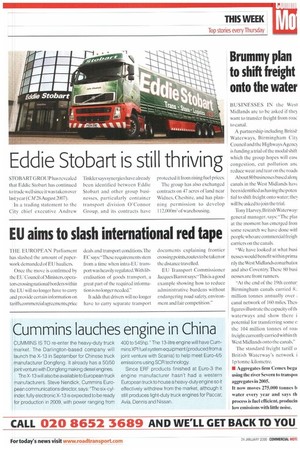Brummy plan to shift freight onto the water
Page 7

If you've noticed an error in this article please click here to report it so we can fix it.
BUSINESSES IN the West Midlands arc to be asked if the) want to transfer freight from roae to canal.
A partnership including British Waterways, Birmingham Cit) Council and the Highways Agenc) is funding a trial of the modal shift which the group hopes will ease congestion, cut pollution an reduce wear and tear on the roads About 80 businesses based alonl canals in the West Midlands have been identified as having the poten, tial to shift freight onto water: the will be asked to join the trial.
Tony Harvey,British Waterway: general manager, says: "The plat at the moment has emerged Iron some research we have done will people who are commercial freigh carriers on the canals.
"We have looked at what busi nesses would benefit within prima rily the West Midlands conurbatioi and also Coventry. These 80 busi nesses are front runners.
"At the end of the 19th centur: Birmingham canals carried 8.: million tonnes annually over ; canal network of 160 miles. Thes. figures illustrate the capacity of th waterways and show there i potential for transferring some c the 104 million tonnes of row freight currently carried within th West Midlands onto the canals."
The standard freight tariff o British Waterway's network i lpitonne-kilometre.
• Aggregates firm Cemex hega using the river Severn to transpot aggregates in 2005.
It now moves 275,000 tonnes b water every year and says th process is fuel efficient, producin low emissions with little noise.








































































































































































